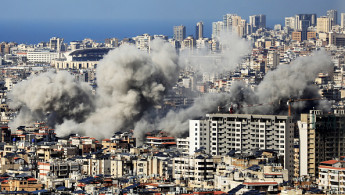New wave of strikes on Beirut as Israel rules out Lebanon ceasefire
Mass airstrikes hit the south of Beirut on Tuesday as the Israeli defence minister ruled out a ceasefire in Lebanon, vowing to continue attacking Hezbollah with full force.
The Israeli strikes came less than an hour after evacuation orders were issued for Haret Hreik, Ghobeiry and Laylaki, all municipalities in Beirut’s southern suburbs, known as Dahiyeh.
Plumes of smoke were seen rising above the southern neighbourhoods, and videos showed large-scale destruction following 13 strikes within hours.
People rushed to evacuate following the warnings by the Israeli military that 11 buildings would be targeted.
While most residents of the densely populated area have already left their homes, many had stayed put.
Dahiyeh has witnessed near-nightly airstrikes when Israel intensified its offensive in Lebanon in September but for the past few weeks attacks on the suburbs have become less frequent.
Hezbollah and the Israeli military have been trading shots since October 2023 over the war on Gaza. The cross-border hostilities spiralled into a full-blown war in September, after Israel carried out a string of pager and walkie-talkie attacks, began a ferocious aerial campaign, and eliminated most of Hezbollah’s senior command structure.
At the start of last month, Israeli troops crossed into southern Lebanon, beginning what they called "limited ground operations", which had destroyed dozens of villages on the border.
While air strikes have been focused on Beirut’s southern suburbs, southern Lebanon, and the eastern Beqaa region – Hezbollah’s main support base– some attacks have happened outside these regions.
Monday night saw an airstrike on Ain Yaaqoub, a village in north Lebanon’s rural Akkar district.
A three-storey building accommodating a displaced family from the south and a Syrian refugee family was hit, bringing it down and killing at least 16 people and wounding 10 others, according to the latest toll.
The village’s residents rushed to nearby hospitals to donate blood, while a bulldozer was seen clearing the rubble on Tuesday.
Reports had said the targeted building belonged to Hezbollah chief Naim Qassem’s relative. The New Arab could not verify this.
This is the second time Akkar has been targeted with a bridge connecting two villages close to the Syrian border hit, but no casualties were reported.
Nearly all crossings between Lebanon and neighbouring war-torn Syria have been bombed, which analysts say is intended to cut off Hezbollah’s supply routes.
'No ceasefire'
Meanwhile, Israel claims it has severely damaged Hezbollah’s defence capabilities, and newly appointed Katz alleging over the weekend that Israel had “defeated” the Shia group.
On Tuesday, Katz said on X on that during a meeting with military officials, he reiterated that Israel would continue hitting Hezbollah with full force and there would be no ceasefire until all goals were achieved.
It comes amid conflicting media reports in recent days of "progress" in the ceasefire talk, as rumours US mediator Amos Hochstein could visit Beirut again this week.
Hezbollah strongly denied Katz's claims, saying it had enough arms to fight a "long war" as its fighters battle Israeli forces in south Lebanon and continue to fire projectiles into northern Israel.
The Israeli military said on Tuesday a number of drones were reported over the coastal town of Acre and its aircraft tried to intercept them, but some had successfully landed.
One drone hit Nesher, east to the port city of Haifa. Several explosions were heard over the Haifa region.
Monday saw attacks in Karmiel and the Haifa suburb of Kiryat Ata. Videos showing damage to buildings and burnt vehicles were shared online. There were also reports of more people evacuating Haifa.
Israel has vowed to return tens of thousands of its citizens to the north who left once fighting with Hezbollah erupted. But Hezbollah has said it wants to prevent this and said it was open to a ceasefire only once Israel stops attacking Lebanon.




 Follow the Middle East's top stories in English at The New Arab on Google News
Follow the Middle East's top stories in English at The New Arab on Google News
![A group of Palestinians, foreign and Israeli activists gather to participated in an olive picking event on the land in the town of Battir, which is under threat of confiscation by Israel in Bethlehem, occupied West Bank on 8 November 2024. [Getty]](/sites/default/files/styles/image_330x185/public/2182930803.jpeg?h=199d8c1f&itok=__0LgGsa)

![People gathered around the rubble of destroyed houses to search for survivors [Getty]](/sites/default/files/styles/image_330x185/public/2024-11/GettyImages-2184733820.jpg?h=199d8c1f&itok=NiM1LO2f)